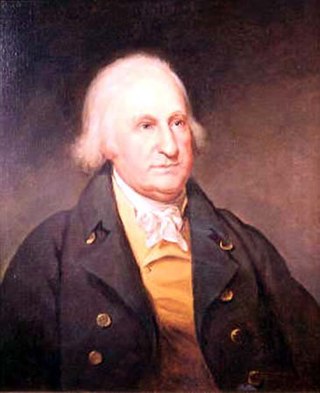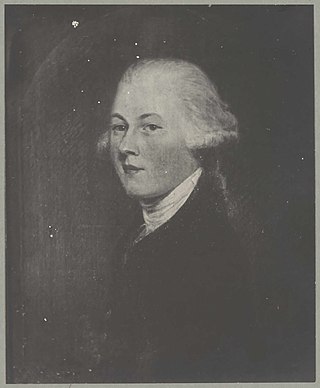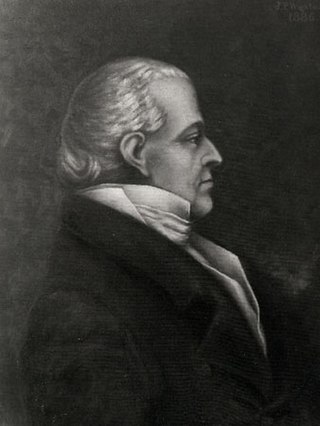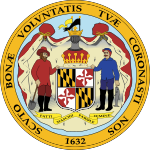
John Eager Howard was an American soldier and politician from Maryland. He was elected as governor of the state in 1788, and served three one-year terms. He also was elected to the Continental Congress, the Congress of the Confederation, the United States Senate, and the Maryland Senate. In the 1816 presidential election, Howard received 22 electoral votes for vice president on the Federalist Party ticket with Rufus King; the ticket lost to Democratic-Republicans James Monroe and Daniel D. Tompkins in a landslide.

The 1791 United States Senate election in New York was held on January 19, 1791, by the New York State Legislature to elect a U.S. Senator to represent the State of New York in the United States Senate. The election was conducted by a system of approval voting.

The 1790–91 United States Senate elections were held on various dates in various states. These U.S. Senate elections occurred during the first midterm election cycle, which took place in the middle of President George Washington's first term. As these elections were prior to the ratification of the Seventeenth Amendment in 1913, senators were chosen by state legislatures. Senators were elected over a wide range of time throughout 1790 and 1791, and a seat may have been filled months late or remained vacant due to legislative deadlock. In these elections, terms were up for the nine senators in Class 1.

The 1788–1789 United States Senate elections were the first U.S. Senate elections following the adoption of the Constitution of the United States. They coincided with the election of George Washington as the first president of the United States. As these elections were prior to the ratification of the Seventeenth Amendment in 1913, senators were chosen by state legislatures.

The 1788 Maryland gubernatorial election was held on 10 November 1788 in order to elect the Governor of Maryland. Federalist candidate John Eager Howard was elected by the Maryland General Assembly against his opponent, fellow Federalist candidate and former Governor Thomas Johnson. The exact results of this election are unknown.

The 1789 Maryland gubernatorial election was held on 16 November 1789 in order to elect the Governor of Maryland. Incumbent Federalist Governor John Eager Howard was easily re-elected by the Maryland General Assembly as he ran unopposed. The exact results of this election are unknown.

The 1790 Maryland gubernatorial election was held on 8 November 1790 in order to elect the Governor of Maryland. Incumbent Federalist Governor John Eager Howard was easily re-elected by the Maryland General Assembly as he ran unopposed. The exact results of this election are unknown.

The 1792 Maryland gubernatorial election was held on 3 April 1792 in order to elect the Governor of Maryland, following the death of Governor George Plater in office. Federalist candidate and former Governor Thomas Sim Lee was elected by the Maryland General Assembly against other candidates to complete the term of late Governor Plater, before winning a full term in his own right on 12 November 1792. The exact results of these elections are unknown.

The 1793 Maryland gubernatorial election was held on 15 November 1793 in order to elect the Governor of Maryland. Incumbent Federalist Governor Thomas Sim Lee was easily re-elected by the Maryland General Assembly as he ran unopposed. The exact results of this election are unknown.

The 1794 Maryland gubernatorial election was held on 17 November 1794 in order to elect the Governor of Maryland. Federalist candidate and former member of the Maryland House of Delegates John Hoskins Stone was elected by the Maryland General Assembly against his opponent, fellow Federalist candidate Levin Winder. The exact results of this election are unknown.

The 1795 Maryland gubernatorial election was held on 9 November 1795 in order to elect the Governor of Maryland. Incumbent Federalist Governor John Hoskins Stone was easily re-elected by the Maryland General Assembly as he ran unopposed. The exact results of this election are unknown.

The 1796 Maryland gubernatorial election was held on 15 November 1796 in order to elect the Governor of Maryland. Incumbent Federalist Governor John Hoskins Stone was easily re-elected by the Maryland General Assembly as he ran unopposed. The exact results of this election are unknown.

The 1797 Maryland gubernatorial election was held on 13 November 1797 in order to elect the Governor of Maryland. Federalist candidate and incumbent United States Senator John Henry was easily elected by the Maryland General Assembly as he ran unopposed. The exact results of this election are unknown.

The 1798 Maryland gubernatorial election was held on 14 November 1798 in order to elect the Governor of Maryland. Federalist candidate Benjamin Ogle was elected by the Maryland General Assembly against his opponent, fellow Federalist candidate Nicholas Carroll. The exact results of this election are unknown.

The 1799 Maryland gubernatorial election was held on 18 November 1799 in order to elect the Governor of Maryland. Incumbent Federalist Governor Benjamin Ogle was easily re-elected by the Maryland General Assembly as he ran unopposed. The exact results of this election are unknown.

The 1800 Maryland gubernatorial election was held on 10 November 1800 in order to elect the Governor of Maryland. Incumbent Federalist Governor Benjamin Ogle was easily re-elected by the Maryland General Assembly as he ran unopposed. The exact results of this election are unknown.

The 1807 Maryland gubernatorial election was held on 9 November 1807 in order to elect the Governor of Maryland. Incumbent Democratic-Republican Governor Robert Wright was re-elected by the Maryland General Assembly against Federalist candidates former United States Senator Charles Carroll and former Governor John Eager Howard in a near rematch of the previous election.

The 1808 Maryland gubernatorial election was held on 14 November 1808 in order to elect the Governor of Maryland. Incumbent Democratic-Republican Governor Robert Wright was re-elected by the Maryland General Assembly against Federalist candidates former Governor Thomas Johnson, fellow former Governor John Eager Howard and former United States Senator Richard Potts.

The 1821 Maryland gubernatorial election was held on 10 December 1821 in order to elect the Governor of Maryland. Incumbent Democratic-Republican Governor Samuel Sprigg was re-elected by the Maryland General Assembly against former Federalist Governor Charles Goldsborough, Democratic-Republican candidates John Leeds Kerr and George C. Washington and Federalist candidates Robert Goodloe Harper, Robert Henry Goldsborough, John Eager Howard, John C. Herbert and Roger B. Taney.

The 1791 North Carolina gubernatorial election was held on 29 December 1791 in order to elect the Governor of North Carolina. Incumbent Federalist Governor Alexander Martin was re-elected by the North Carolina General Assembly against Federalist candidate Richard Dobbs Spaight, Federalist candidate and incumbent Speaker of the North Carolina Senate William Lenoir and candidate James Coor.











